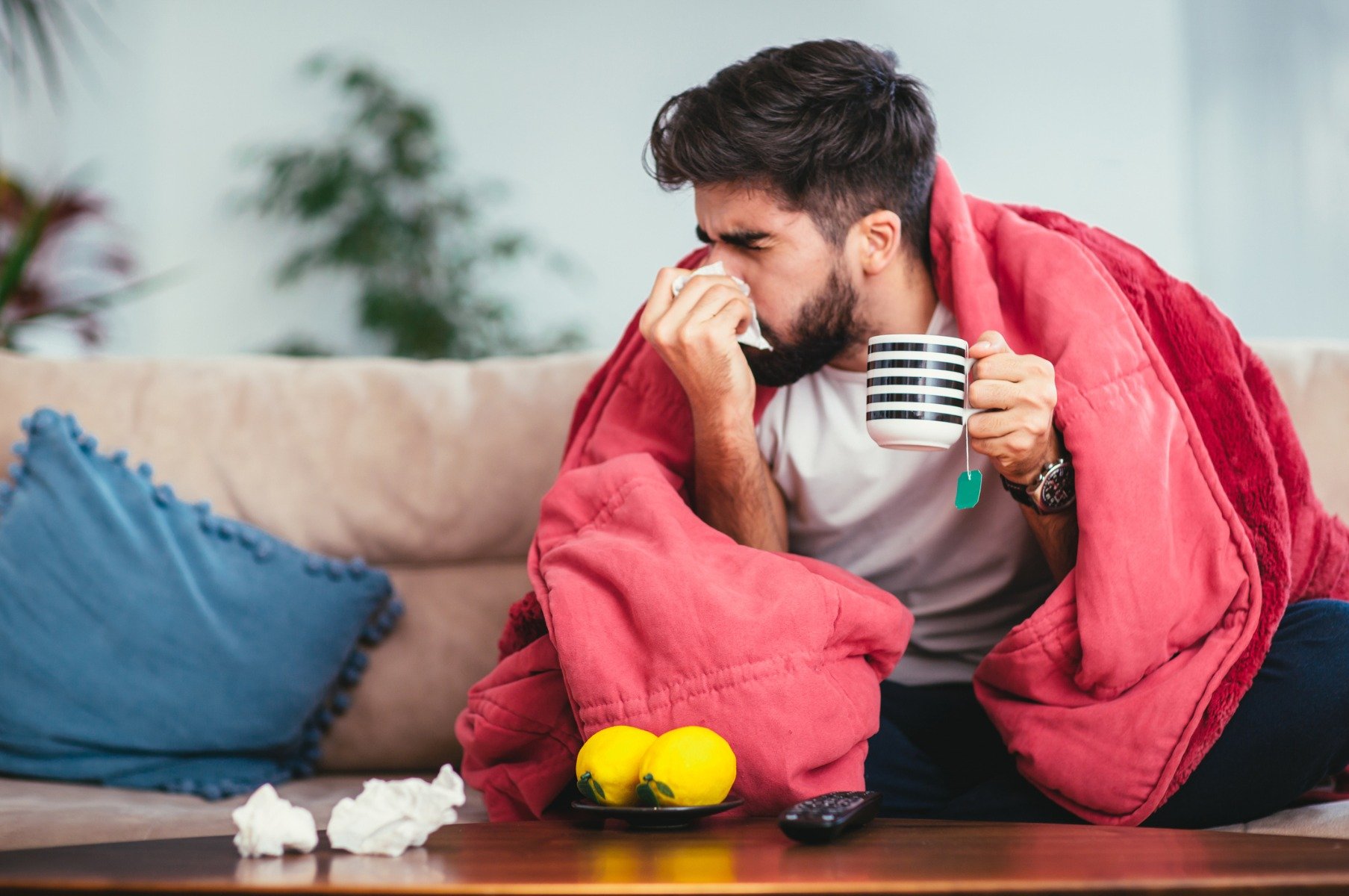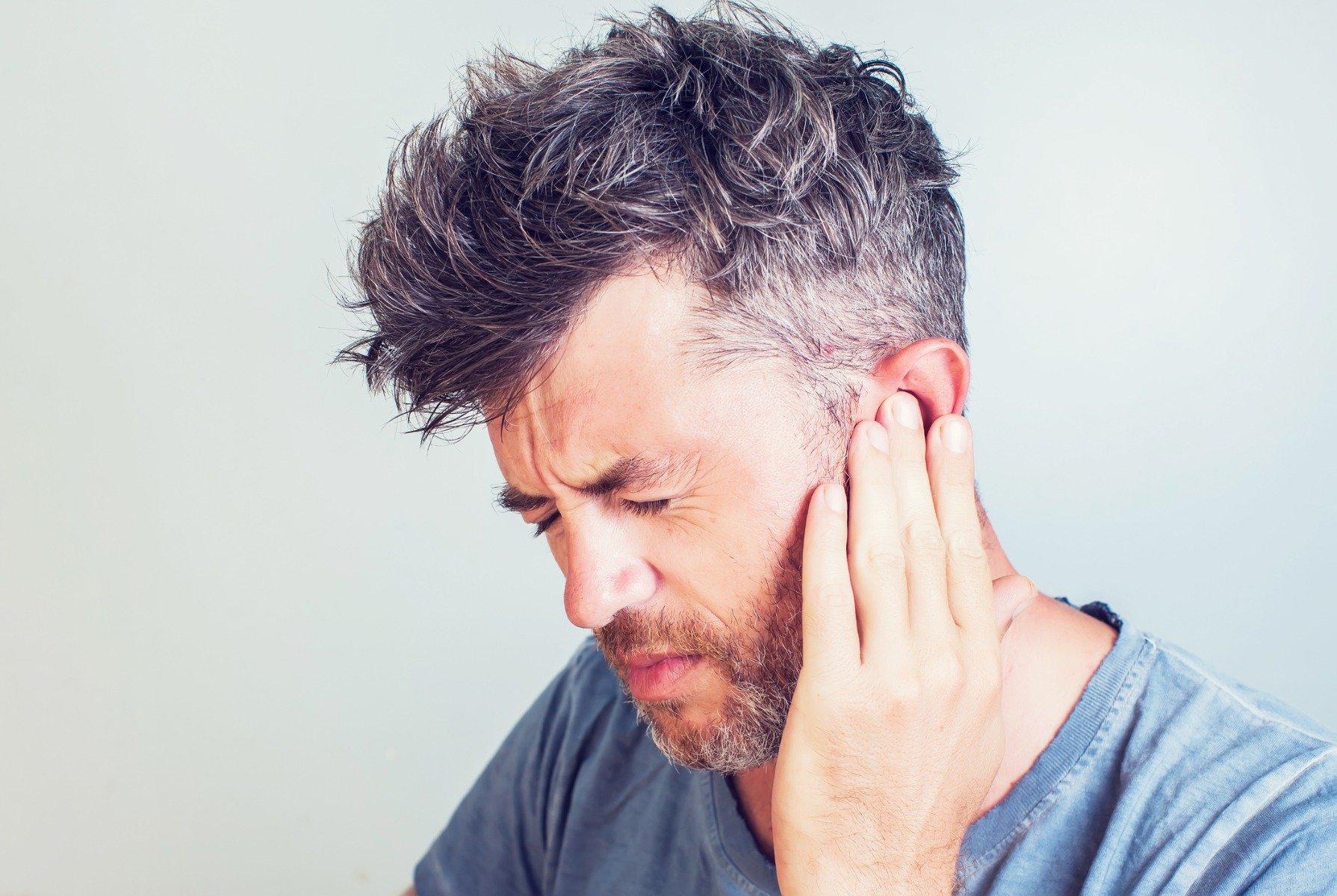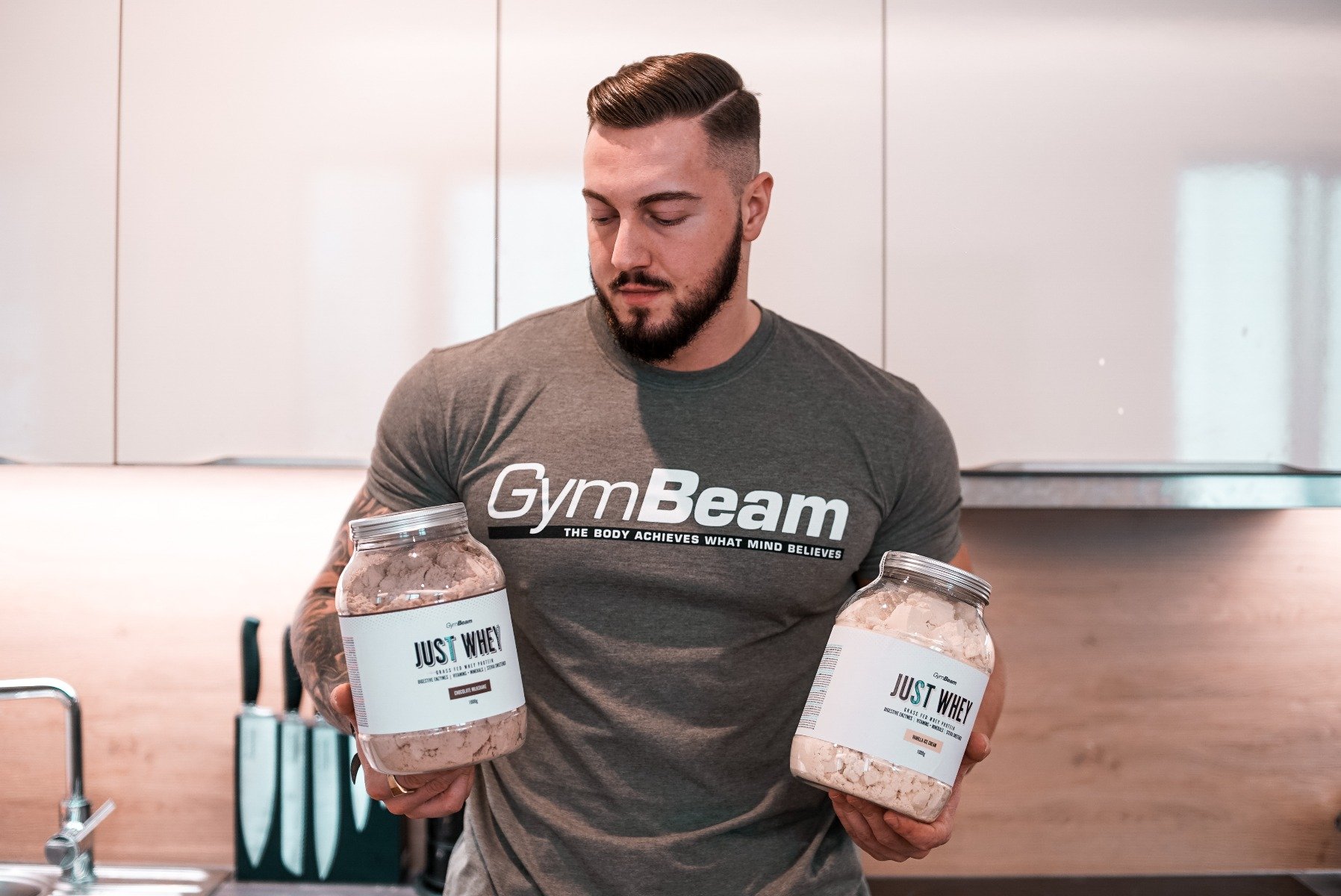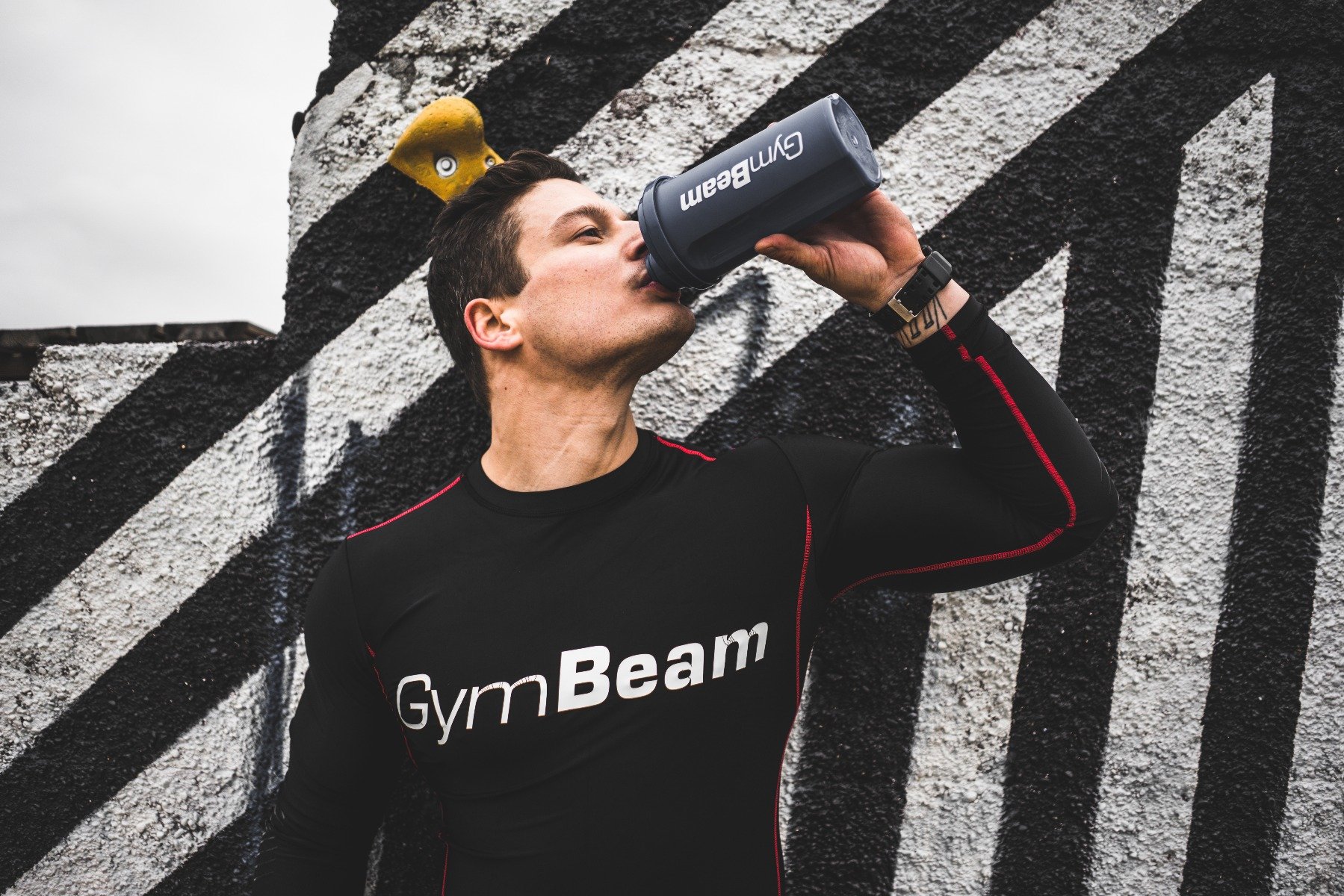Table of Contents
Do you know that feeling? You’ve been training for 8 weeks and everything went as it should. However, the last 4 weeks were very challenging for you. You had more stress at work than usual, you had to complete a demanding project, so you didn’t have time to sleep. Over the weekend, a friend celebrated his birthday and you had some cakes and a few drinks. The cherry on the cake is that a cold colleague has been sitting next to you all week long.
You woke up this morning with throat pain, clogged nose, and you feel like you lost a match with Conor McGregor last night. You got sick. But can you exercise at the time of illness?
It depends on how serious your health is. Sometimes exercise may be better for you than medicines, but at other times you risk getting into a catabolic state and losing your strength and muscle mass. [1] In the article, we will talk more about on the basis of what to decide between training and bed.

When to practice during the illness and when to better skip training?
The golden rule is to listen to your body. If you are in pain, you are tired, you have fever and you cannot get out of bed, you should be treated and skip training for a few days. If you have runny nose, throat aches, but you still have a dose of energy to exercise, you can continue the training plan.
Experts recommend obeying the following procedure [2]:
- You can exercise if the symptoms of the illness manifest from the throat higher. This includes cold, clogged nose, sneezing, or mild throat pain. However, it is good if, in this case, it is better if you slow down the pace of exercise and shorten your sporting activity.
- Certainly, you should not exercise unless the symptoms of the illness manifest from the throat below. This means that you suffer from chest pain, choking, or stomach aches.
- Exercise is forbidden if you have fever, feel very tired or suffer from extensive muscle pain.
Illnesses in which you can practice
The second indicator is the following list of illnesses during which you can take training. However, if you are unsure whether you can exercise or not, ask your doctor.
1. Weak cold
Cold is a viral infection of the nose and throat. Although the symptoms may vary, most people suffer from clogged nose, headache, sneezing, and coughing when they get cold. [3] In general, you can go to exercise with a cold, but remember that you can spread germs among people and thus infect them.
Therefore, you should pay attention to increased hygiene to avoid spreading cold. When sneezing and coughing, cover your mouth with your hand and then wash your hands. [4]
2. Ear pain
It is a sharp, blunt or burning pain in one or both ears. Ear pain in adults is caused by pain in another area of the body. For example, throat pain may be transmitted to the ear pain. Such diseases are caused by sinus infections, inflamed throat, tooth infections, or pressure changes. [5] [6]
However, exercising with ear pain is considered safe unless you have an infection and pain does not affect balance maintenance.

3. Clogged nose
A clogged nose is frustrating and annoying for many of us. The full nose is often associated with fever or other symptoms such as strong cough and chest pain. In these cases, you should take your time off from work and from training.
On the other hand, if you do not have these symptoms, exercise can help you to clear the nose and release breathing. [7]
4. Throat pain
Throat pain is usually caused by a viral infection such as cold or flu. [8]
If you only suffer from a mild throat pain caused by a common cold or allergy, exercise is safe for you. If the throat pain accompanied with higher body temperature, difficulties with swallowing, or other symptoms, you should seek medical advice.
In general, it is recommended to include rather less demanding sports activities at a slow pace and low load at the time of the disease. That’s why you should exchange strength training, HIIT workout or resistance training for activities like [9]:
- a walk
- jogging
- swimming
- cycling
- Tai Chi
- yoga
You can do all of the above activities in the fresh air, thus reducing the risk of spreading the disease among people in the gym.

Illnesses during which you should not exercise
Don’t worry, a few days off will not ruin your efforts. On the contrary, leisure and regeneration will only benefit your body, and therefore, if you suffer from any of the following diseases, be sure to stay at home in bed and leave the training for another day.
1. Fever
We have already mentioned fever a few times, but now we will explain why it is dangerous to exercise with high body temperature. When you have fever, your body temperature rises above 37 °C, and can cause discomfort such as weakness, dehydration, muscle pain and loss of appetite. If you exercise at the time of fever, you increase the risk of dehydration and you can harm your body even more. High temperature is a symptom of bacterial or viral infection. [10]
In addition, fever reduces muscle strength and endurance, aggravates coordination, thereby increasing the risk of injury and hurt during training. [11]
2. Strong or frequent cough
Occasional cough is a natural reaction to irritants or fluids in respiratory tract. However, frequent coughing may be a symptom of respiratory infection, such as cold, flu, or even pneumonia.
While coughing is associated with scratching in the throat, there is no reason to skip training. However, prolonged or intense cough is a signal that your body needs rest. Such a cough can make breathing more difficult and cause shortness of breath during training.
A cough that is accompanied by mucus may be a sign of infection or other disease and therefore requires a doctor’s check. In addition, cough is one of the main factors in the transmission of infections and diseases. [12] If you cough, you should avoid a closed gym area to avoid unnecessarily exposing people to contagion.
3. Stomach problems
Diseases that affect the digestive system, such as intestinal flu, can cause severe symptoms, such as nausea, vomiting, diarrhoea, fever, stomach cramps, or reduced appetite.
A feeling of weakness is often associated with digestive problems, causing an increased risk of injury during training. In addition, many stomach problems, including intestinal flu, are highly contagious and easily spread to others, so you should consider home treatment without training.
If you have enough energy or need to relax during digestion, try light stretching and yoga in the comfort of home.

4. Flu
Flu is a contagious disease that affects the respiratory system. It causes symptoms such as fever, shiver, throat pain, general fatigue, muscle sensitivity and cough. Flu may have a mild course or be severe and, in the worst case, also cause death.
Those people who have an elevated temperature along with the flu are at risk of dehydration. You should never exercise during flu because it can delay recovery and worsen your health. Physical activity at a higher intensity temporarily suppresses the body’s immune response, which leads to a slowdown of healing. [13]
Remember that flu is a very contagious virus that spreads through droplets in the form of coughing or sneezing. If your doctor has diagnosed you with flu, you should avoid public spaces as well as exercise.
5 tips to prevent muscle loss during the disease
A healthy diet is essential for every athlete, especially at the time of illness. For unknown reasons, however, even the most disciplined athletes consume sweets, milk cookies, hot chocolate, or ice cream at the time of illness. That’s why we’ll tell you what to eat and what you should avoid during treatment.

1. Receive enough calories
Surely, you’re afraid that while you lie down with the flu in your bed, your body gets fat. However, it is important to realize that a balanced diet helps you maintain physical fitness and also supports the immune system. Remember, it’s much easier to get rid of that little fat than to get back a few kilograms of muscle you’ve lost in the time of illness.
Therefore, reduce your normal caloric intake by 100 to 150 calories. Divide the diet into 5-6 smaller portions and maintain a macronutrient ratio. Limit carbohydrate intake to compensate for the reduction in calories and the effect of training. [14]
You might be interested in these products:
2. Regularly replenish proteins
The need for protein intake increases during the period of stress, and the disease and cold are stressful factors for the body. A study of critically ill people in hypermetabolic and catabolic states found that higher protein intake is associated with a positive nitrogen balance, while low protein intake led to muscle catabolism. [15]
You may not be very fond of tasting steak, omelette or curd during your illness, but they should become your medicines. If you get a sweet tooth, do not choose biscuits, but mix your favourite protein to resolve protein intake and taste for sweet.

3. Replenish low glycemic index carbohydrates
At the time of illness, the body is unable to process the carbohydrates in the same way as when you receive them immediately after training. Therefore, the best solution is to focus on receiving low glycaemic index carbohydrates in the morning hours when muscle cells are most sensitive to glycogen storage. [14]
4. Maintain high intake of healthy fats
Fat is the primary source of energy for cells at rest time. Your body will form a number of new immune cells while fighting the disease, and fatty acids are an important component of any new cell membrane. Therefore, you should offer your organism the best building units, and these are omega fatty acids.
Fish oil, linseed oil or omega-3 capsules will serve as a sufficient source of healthy fats. You do not need to increase the dose of omega-3 fatty acids during the disease by keeping the recommended dosage.
5. Don’t forget about hydratation
You may think that if you don’t exercise, you don’t have to worry about dehydration. But this is a big mistake. The body loses daily plenty of fluids, independent of training or exercise. People lose water through the process of breathing, excretion and sweating. Moreover, during illness, fluid supplies are drained by mucus production, fever, and the fact that the body constantly creates new cells. Therefore, drink at least 2 litres of water a day, or even more.
Also, remember to add supplements to your diet, such as vitamins and minerals to help fight inflammation. The following lines will tell you which of them are most important to the human body at the time of the disease.

6 nutritional supplements you need during the illness
The organism fights infection and therefore it is necessary to support the immune system and to supply the body with the vitamins and minerals it needs. This effectively reduces regeneration time and returns to the gym faster. The nutritional supplements that we will talk about also serve to prevent disease, so you should constantly supplement them.
1. Vitamin C
Vitamin C (or ascorbic acid) is probably the most basic nutritional supplement at the time of weakened immunity. It is a vital component of every cell in the body. Vitamin C is most widely found in white blood cells. During infection, the body uses vitamin C found in leukocytes to prevent oxidative damage. This will cause a significant decrease in vitamin C levels as well as immunity of the body. [17] [18]
Despite some controversial studies, vitamin C supplementation seems to improve several aspects of the human immune response and improve the function of three of the five types of leukocytes, lymphocytes, neutrophils and monocytes. [19] [20] [21]
Therefore, based on the available literature, we recommend taking 2 – 2.5 g of vitamin C daily, at the time of normal training conditions. In case of disease symptoms, increase the dose to 4-5 g of vitamin C daily. However, make sure that you receive the dose divided into smaller 500 mg doses that you are taking during the day.

2. Vitamin E
Probably as important as vitamin C is vitamin E, which, together with selenium, works in tissues to reduce lipid membrane damage during infection. Vitamin E has been shown to be effective in improving multiple immune function parameters. It increases white blood cell production, improves antibody response, and reduces some viruses. At the same time, it can serve to prevent loss of appetite and weight loss caused by flu and disease as such. [17] [22] [23] [24]
That is why you should not forget to supplement vitamin E in your diet, but at the time of illness and weak immunity, we recommend that you also receive it as a nutritional supplement.
3. Glutamine
We all know how important glutamine is for muscle growth and regeneration. However, glutamine is the essence of the immune system. More than 40% of glutamine in the body supports the digestive tract and this amino acid also affects the functioning of other parts of the body, including the liver, brain and muscles. [25] [26]
The body’s response to infection, injury and stress in the overall perception is such that it begins to take glutamine from the muscles. Normally, this is not a problem because the body can produce glutamine itself. However, at the time of disease, many organs require increased consumption of glutamine. This means that the combination of immune system needs, metabolic processes and the digestive tract consumes glutamine faster than usual, so your hardly worked muscles serve the body’s primary source of glutamine. [27]
This is why you should supplement glutamine, especially at the time of the disease.
4. Zinc
Studies on zinc supplementation have produced several positive results in the field of strengthening the body’s immune functions. Zinc has been shown to reduce the duration of the disease or upper respiratory tract infection, which is why zinc is added to nasal sprays. [28] [29] [30]
Therefore, at the time of the disease, you should always have zinc at hand. The recommended dose of zinc is between 25 – 100 mg per day, while the ZMB6 nutritional supplement gives you the necessary dose of zinc supplemented with supportive B group vitamins and magnesium mineral to help speed up recovery.
5. Vitamin D3
Vitamin D deficiency is a global problem. It’s alarming because little vitamin D can cause cardiovascular disease, diabetes, hypertension and many other chronic diseases. [1]

Vitamin D is also very much needed for the immune system. It supports the body’s immune response, has anti-inflammatory effects and has antimicrobial effects. It can suppress colds, flu and many other diseases. [1]
Most people lack vitamin D because we prefer it from sunlight and many people avoid sunbathing because they fear skin cancer. On the other hand, those who spend more time in the sun are using sunscreen to block UVB rays that allow vitamin D production in the body. Therefore, do not forget to take vitamin D as a supplement and diet.
6. Ginger Shot
Ginger has many benefits to human health. It acts anti-inflammatory, helps to fight infections and belongs to the category of superfoods that supply the body with vitamins and minerals. [31]
Ginger Shot Extract – Ginger Shot – can prevent the spread of various types of bacteria. It is also very effective against gingivitis bacteria or RSV virus, which causes many respiratory diseases. Ginger also works great as a prevention. [32] [33] [34]

How to get back to the form after the illness?
When the symptoms of the disease begin to fade, you will feel energetic and strong. However, your immune system is not yet ready for a quick leap into the established lifestyle. But there are some indicators that will tell you if you are ready to go back to the gym. [16]
- Heartbeat – measure your heartbeat or pulse as soon as you wake up. The normal resting heart rate is between 60-100 strokes in an adult. If your heart rate moves in these numbers, you’re ready to start training.
- Breathing – make sure you don’t have breathing problems, don’t feel chest pain and do not suffer from regular coughing
- Listen to your body – if you feel very tired even after mild activity, your body needs time. So, take a few more days of regeneration until you’re fit. If you’ve passed all three indicators, you can go back to the gym. However, follow these little advice to prevent illness due to weakened immunity.
- Start slowly and gradually. If you follow a set training plan, go back to the week before you got sick.
- Increase fruit and vegetable intake. Give your body enough vitamins and minerals to support the immune system. Give yourself a Ginger Shot and don’t forget to eat 3 to 5 portions of fruit or vegetables per day.
- Observe at least 7 hours of sleep.
- Stop feeling guilty. It is normal for a person to become sick and therefore not threaten your immune system by throwing yourself too fast on training and exercise. Give yourself time. Your body will thank you later.
How often are you sick? Do you get sick and you have to skip a few days of training? Or did sport boost your immunity so much that you didn’t lie in bed for a long time? Tell us what nutritional supplements you take at the time of the disease. If this article has enriched you with new information, please support it by sharing it.
[1] Robert Yang - Don´t let sickness derail yourt progress – https://www.t-nation.com/training/dont-let-sickness-derail-your-progress
[2] Edward R. Laskowski - Is it ok to exercise if I have cold? – https://www.mayoclinic.org/healthy-lifestyle/fitness/expert-answers/exercise/faq-20058494
[3] Graham Worall - Common cold – https://www.ncbi.nlm.nih.gov/pmc/articles/PMC3215607/
[4] Common colds overview – https://www.ncbi.nlm.nih.gov/books/NBK279543/
[5] MedlinePlus - Earache – https://medlineplus.gov/ency/article/003046.htm
[6] Mohammad Hosein Taziki, Nasser Behnampour. A Study of the Etiology of Referred Otalgia – https://www.ncbi.nlm.nih.gov/pmc/articles/PMC3846197/
[7] Jillian Kubala - Working out while sick: Good or Bad? – https://www.healthline.com/nutrition/working-out-while-sick
[8] ESCMID Sore Throat Guideline Group, Pelucchi C, Grigoryan L, Galeone C, Esposito S, Huovinen P, Little P, Verheij T. - Guideline for the management of acute sore throat. – https://www.ncbi.nlm.nih.gov/pubmed/22432746
[9] Ryan Andrews - Exercise when sick: Should you sweat it out? Or rest and recover? – https://www.precisionnutrition.com/working-out-when-sick
[10] How is body temperature regulated and what is fever? – https://www.ncbi.nlm.nih.gov/pubmedhealth/PMH0072641/
[11] Natalie A. Dick, Jason J. Diehl - Febrile Illness in the Athlete – https://www.ncbi.nlm.nih.gov/pmc/articles/PMC4000470/
[12] Matthew J. Martin, Tim W. Harrison - Causes of chronic productive cough: An approach to management – http://www.resmedjournal.com/article/S0954-6111(15)30001-9/
[13] Stephen A. Martin, Brandt D. Pence,Jeffrey A. Woods - Exercise and Respiratory Tract Viral Infections – https://www.ncbi.nlm.nih.gov/pmc/articles/PMC2803113/
[14] Eric Cressey - Sick Happens: The Complete Guide to Maintaining Muscle When You’re Sick– http://romanfitnesssystems.com/articles/staying-fit-when-sick/
[15] Energy metabolism, nitrogen balance, and substrate utilization in critically ill children – https://www.researchgate.net/publication/11667698_Energy_metabolism_nitrogen_balance_and_substrate_utilization_in_critically_ill_children
[16] When am I ready to exercise again after I’ve been sick? – https://www.health24.com/Fitness/Exercise/Exercise-and-health/when-am-i-ready-to-exercise-again-after-ive-been-sick-20180524
[17] Field CJ1, Johnson IR, Schley PD. - Nutrients and their role in host resistance to infection. – https://www.ncbi.nlm.nih.gov/pubmed/11781377
[18] Schwager J1, Schulze J. - Modulation of interleukin production by ascorbic acid. – https://www.ncbi.nlm.nih.gov/pubmed/9656430
[19] Hemilä H - Vitamin C and common cold incidence: a review of studies with subjects under heavy physical stress. – https://www.ncbi.nlm.nih.gov/pubmed/8858411
[20] Hemilä H, Douglas RM. - Vitamin C and acute respiratory infections. – https://www.ncbi.nlm.nih.gov/pubmed/10488881
[21] Prinz W, Bortz R, Bregin B, Hersch M. - The effect of ascorbic acid supplementation on some parameters of the human immunological defence system. – https://www.ncbi.nlm.nih.gov/pubmed/914459
[22] Meydani SN, Barklund MP, Liu S, Meydani M, Miller RA, Cannon JG, Morrow FD, Rocklin R, Blumberg JB. - Vitamin E supplementation enhances cell-mediated immunity in healthy elderly subjects.
[23] Meydani SN, Meydani M, Blumberg JB, Leka LS, Siber G, Loszewski R, Thompson C, Pedrosa MC, Diamond RD, Stollar BD. - Vitamin E supplementation and in vivo immune response in healthy elderly subjects. A randomized controlled trial. – https://www.ncbi.nlm.nih.gov/pubmed/9134944
[24] Han SN, Meydani M, Wu D, Bender BS, Smith DE, Viña J, Cao G, Prior RL, Meydani SN. - Effect of long-term dietary antioxidant supplementation on influenza virus infection. – https://www.ncbi.nlm.nih.gov/pubmed/11034223
[25] Hyeyoung Kim - Glutamine as an Immunonutrient – https://www.ncbi.nlm.nih.gov/pmc/articles/PMC3220259/
[26] Ziegler TR - Glutamine supplementation in cancer patients receiving bone marrow transplantation and high dose chemotherapy. – https://www.ncbi.nlm.nih.gov/pubmed/11533316
[27] Karinch AM, Pan M, Lin CM, Strange R, Souba WW - Glutamine metabolism in sepsis and infection. – https://www.ncbi.nlm.nih.gov/pubmed/11533308
[28] Prasad AS, Fitzgerald JT, Bao B, Beck FW, Chandrasekar PH. - Duration of symptoms and plasma cytokine levels in patients with the common cold treated with zinc acetate. A randomized, double-blind, placebo-controlled trial. – https://www.ncbi.nlm.nih.gov/pubmed/10929163
[29] Al-Nakib W, Higgins PG, Barrow I, Batstone G, Tyrrell DA. - Prophylaxis and treatment of rhinovirus colds with zinc gluconate lozenges. – https://www.ncbi.nlm.nih.gov/pubmed/3440773
[30] Mossad SB, Macknin ML, Medendorp SV, Mason P.- Zinc gluconate lozenges for treating the common cold. A randomized, double-blind, placebo-controlled study. – https://www.ncbi.nlm.nih.gov/pubmed/8678384
[31] Joe Leech - 11 Proven Health Benefits of Ginger – https://www.healthline.com/nutrition/11-proven-benefits-of-ginger
[32] Ponmurugan Karuppiah, Shyamkumar Rajaram - Antibacterial effect of Allium sativum cloves and Zingiber officinalerhizomes against multiple-drug resistant clinical pathogens – https://www.ncbi.nlm.nih.gov/pmc/articles/PMC3609356/
[33] Chang JS, Wang KC, Yeh CF, Shieh DE, Chiang LC. - Fresh ginger (Zingiber officinale) has anti-viral activity against human respiratory syncytial virus in human respiratory tract cell lines. – https://www.ncbi.nlm.nih.gov/pubmed/23123794
[34] Park M, Bae J, Lee DS. - Antibacterial activity of 10-gingerol and 12-gingerol isolated from ginger rhizome against periodontal bacteria. – https://pubmed.ncbi.nlm.nih.gov/18814211/

